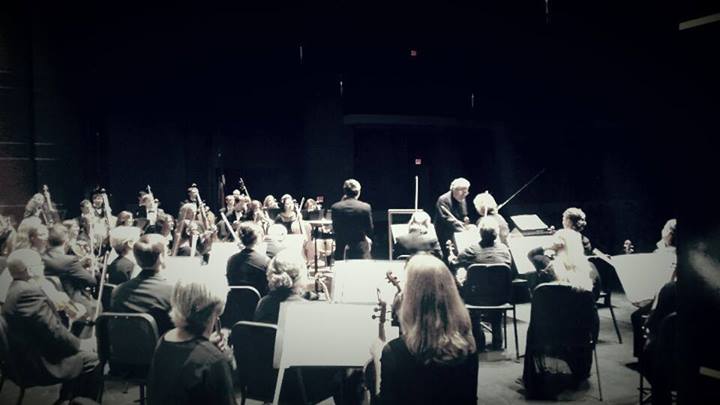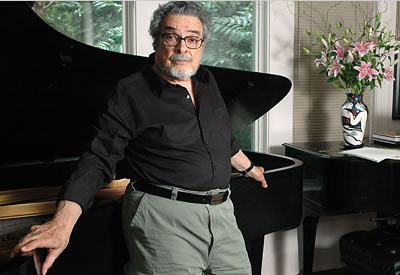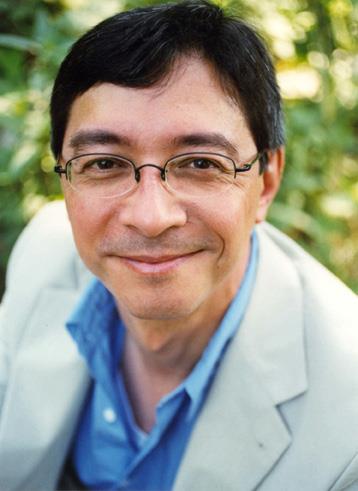Leon Fleisher and the ASO
It's Saturday evening and I'm seated in the 2400-seat Long Center for the Performing Arts, Austin's treasured high-profile concert hall on Lady Bird Lake. Behind the stage, the rear barrier looks like the reference section at a library for giants. I note the new hall smell, but there is still an air of tradition, of intellectualism and weathered Bourgeois culture. For a town known for its hipsters and multicolor murals, the contrast is endearing in a way. While it's unlikely that you'll find short shorts and deep V's here, the audience boasts a fair number of young, dark-haired and well-dressed ladies and gentlemen, the kind who will probably rush to the wet bar at intermission for a scotch and soda.
 Leon Fleisher on stage, shaking hands with the ASO concert master
Leon Fleisher on stage, shaking hands with the ASO concert master
Really, wherever you go, concert halls are more or less the same. Orchestras play more or less the same music. And audiences behave in more or less predictable ways. Being a once crestfallen classical musician and a new Austinite, even in this unfamiliar space I feel somehow comforted. The old guard breathes a raspy, contented sigh, and I sink into my seat, cautiously aware of a deep feeling of homecoming.
As the ASO takes their A440, a woman behind me whispers to her neighbor. "A little high," she says. And it's with this self-righteous comment—not uncommon at classical concerts—that I'm reminded that even at home (especially at home?) one might still find aspects of the culture irritating.
 Pianist Leon Fleisher
Pianist Leon Fleisher
A spontaneous national anthem begins the concert, bringing the crowd gradually to their feet. In the audience, one can sense a palpable resistance to this gesture: collective eye-rolling from the progressives churns the air; most are standing with their hands clasped in front of them, either not singing or only mouthing the words. Some strident older folks take up their slack, leaping octaves left and right rather than attempt the rather ambitious vocal ranging of our national song. As we sit, my friend leans in. "Was not expecting that."
I nod. I can't help thinking that it was some sort of cosmic apology for programming a German Nationalist and bona fide anti-Semite on their season premiere.
Oberon: the last of Carl Maria von Weber's many operas and a staple of early German Romanticism. Maestro Peter Bay has chosen a piece to match his spirited, choreographic conducting. Oberon's fairy-tale themes reflect the 19th-century nation's fixation on folklore—the Grimm brothers published their famous Children's and Household Tales 14 years prior, in 1812. Such themes would reach their apex in the work of Wagner, the defining figure of German mythos.
A stepwise horn call sounds. Oberon's noble exposition lilts upward in a teasing decrescendo. The explosive charge which propels the overture into its wide-eyed middle section visibly caches the audience off guard—no doubt Weber's intended effect. The performance is exciting, straightforward and effective under Bay's well-studied baton. Much applause.
Most importantly, this gallant fantasy proves a suitable primer for the heart of the program, Leon Fleisher's performance of Prokofiev's Piano Concerto No. 4.
Applause for Mr. Fleisher, a staunch figure whose musical refinement vents into the space a couple inches above his skin. He sits and silence descends. After a slightly off-kilter opening flourish, the orchestra catches up with Fleisher, adhering closely to his gestures from then on. When the first movement swells to a dizzying ending, uncertain applause emanates from the right side of the auditorium. "Oh shoot!" says the A440 lady.
In the second movement, Fleisher seems positively to bathe in Prokofiev's shifting harmonies. The Prohibition-era-born musician leans far back on his bench, turning often to the orchestra as if from a hot bathtub. He seems very much to enjoy the concertmaster's solo midway through, though she chooses to keep her formal distance. Throughout this tender movement, the orchestra maintains a keen sense of discretion in their accompaniment; of course, this owes in part to Prokofiev's exquisite orchestration, which recedes at times to a single wandering line in the lower strings. Fleisher's sensitive piano scales mesh with coyly plucked violins and flute as the movement ticks to a stop like a wind up music box.
Cue smacks of applause and groans in perfect counterpoint.
 ASO Maestro Peter Bay
ASO Maestro Peter Bay
Fleisher remains nonchalant through the prankish and virtuosic third movement and the fourth's frantic recapitulation. The Concerto ends to enthusiastic hollers and applause, which bring the piano master out once more. The evening's true highlight now occurs: he once more takes his seat and turns to the hushed audience.
"I'd like to play something as far away from anything you can imagine on this program," he says to the audience's amusement.
"Wait till you see what he can do with two hands," whispers a man in the back.
Little does the man know, the forthcoming piece—an elegant version of Jerome Kern's musical-hit-turned-standard "All The Things You Are," arranged by his former Peabody student Stephen Prutsman—is also written for the left hand only. In the 1960s, a neurological condition called focal dystonia rendered the great pianist's right hand unusable.
His encore performance leaves the audience swooning. Hard. Several mentions of "it's like a Broadway tune" pierce the din.
Intermission reveals the culprits on the right side: a large group of kids. Maybe we shouldn't jump to conclusions so quickly, Ms. A440?
The second half contains a collection of excerpts from The Ring of the Nibelung, the enormous opera tetralogy by Richard Wagner. I expect to hear Wagner, the rule-breaker. The effusive exhibitionist. The man over whom Nietzsche obsessed—the dedicatee and implied hero of "The Birth of Tragedy" and the subject of his scathing essay years later. Instead, the Symphony presents a somewhat murky assortment of tracks which, though all from The Ring, bear little musical relation to each other. The pastoral "Entry of the Gods into Valhalla" erupts into Die Walküre's bombastic "Ride of the Valkyries," the most well-known (and most parodied) of all Wagner excerpts. The cycle is ordered chronologically, but perhaps it is not the most effective ordering. Such an emphatic and ear-catching climax surely needs more revving? The last four excerpts languish in its shadow, unable to develop a coherent plot. Like tasting a fine cheese after chowing on a barbecue chicken wing.
Polite applause rounds out the night. The Wagner cycle was an underestimation of this audience. I'm left wanting more.
...If you want to share your opinions on Saturday's ASO concert, please find me on twitter or leave a comment below!